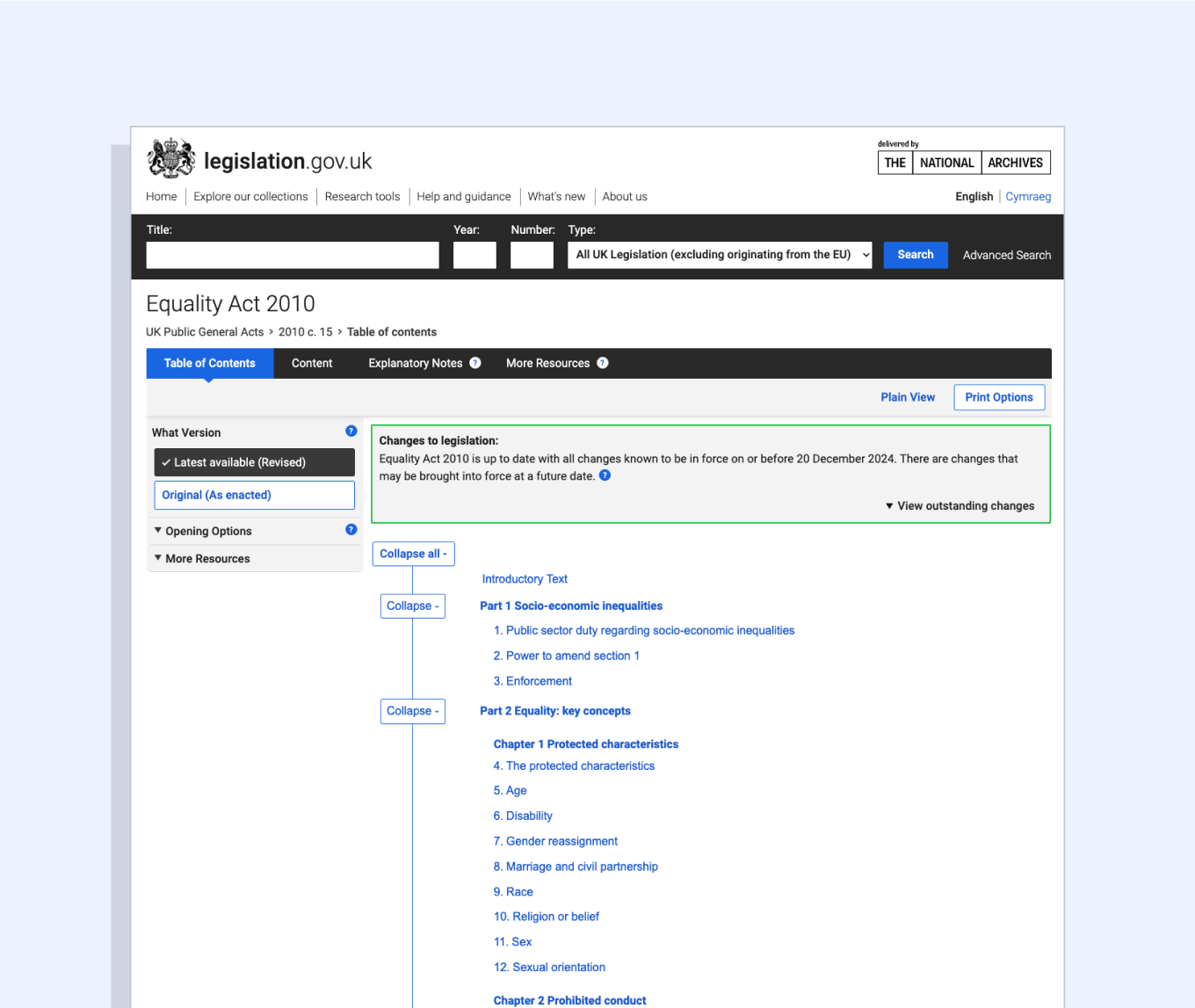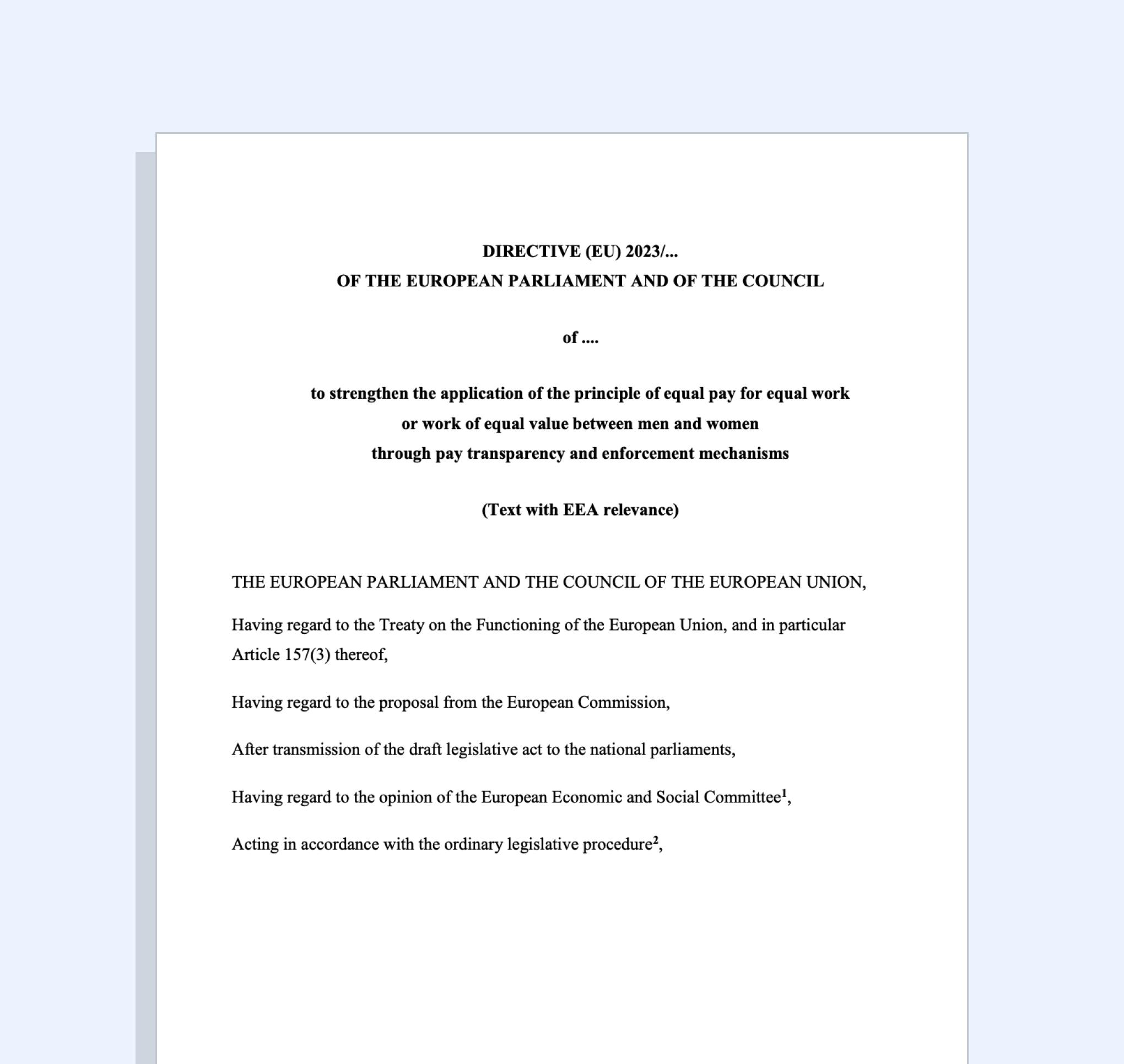Salary confidentiality laws in Europe are currently a bit of a grey area.
GDPR and the UK’s Data Protection Act make it illegal for employers to disclose employee salaries to others – but only if it’s possible to identify the individual whose salary it is.
Pay secrecy clauses to prevent employees discussing salaries with their colleagues are uncommon – but are technically legal in Europe.
Equal pay is enshrined in law in the vast majority of European countries – but it’s rare for it to be a legal requirement that employees can request salary information from their employer in order to verify equal pay structures are actually in place.
This will all change in 2026 when the EU Pay Transparency Directive is officially implemented across EU member states.
In this article we’ll take a closer look at existing salary laws, how they will change with the EU Pay Transparency Directive, and how employers can prepare for this transparent future.
Subscribe to our newsletter for monthly insights from Ravio's compensation dataset and network of Rewards experts 📩
Existing salary confidentiality laws in Europe
There are some existing laws in Europe relating to salary confidentiality, pay secrecy, and salary disclosure – but they’re currently quite limited.
Let’s take a closer look at some of the most common questions on this.
Are salaries confidential in Europe?
Salary confidentiality falls under data protection laws – the General Data Protection Regulation (GDPR) in the EU and the Data Protection Act (DPA) in the UK.
However, it’s definitely a bit of a grey area.
Salary information is considered personal data (and therefore protected) if it is identifiable i.e. if you can detect which individual(s) the salary data belongs to, and if there was no lawful reason for doing so.
As an example, if an employer shared around a spreadsheet without consent that included employee salaries alongside any identifiable attributes e.g. name, employee ID, address, even job title in smaller companies, this would be a breach of data protection laws.
Can companies disclose employee salaries?
As above, employer disclosure of employee salaries is currently governed by data protection laws i.e. GDPR (EU) and DPA (UK).
Salaries are personal data, and so companies can only share employee salary information without consent if it is anonymised with no identifiable characteristics.
The exception to this is if there is a ‘lawful reason’ for disclosure e.g. legal or contractual obligation, task in the public interest, etc.
Are pay secrecy clauses currently legal in Europe?
In most cases yes, pay secrecy clauses are currently legal in Europe.
A pay secrecy clause is when an employer includes an agreement within an employee’s employment contract which prevents the employee from discussing their salary – usually with colleagues, but this may extend to friends or family too.
The vast majority of countries in Europe do not currently have specific legal requirements related to pay secrecy – which means employers are within their rights to include a pay secrecy clause in an employment contract if they want to.
However, there are a couple of notable exceptions to this: the UK and the Nordics.
This will also change when the EU Pay Transparency Directive is rolled out across EU member states (see section below for more information).
🇬🇧 Pay secrecy clauses in the UK
In the UK, section 77 of the 2010 Equality Act specifically makes it illegal for employers to restrict employees from disclosing their own salary information or seeking information about the salary information of colleagues.
However, even with this explicit inclusion in the UK law, pay secrecy clauses remain a bit of a grey area.
This is because the ruling only applies to scenarios where employees are discussing their salaries with the purpose of finding out whether pay discrimination is occurring i.e. to find out whether they are being paid differently to colleagues who perform work of equal value because of their gender.
It therefore isn’t a general ban on pay secrecy clauses being included in employment contracts, it just means that employers cannot enforce the pay secrecy clause if the employee’s discussion relates to equal pay.

💡 The full wording: Section 77 of the UK’s Equality Act
(1) A term of a person's work that purports to prevent or restrict the person (P) from disclosing or seeking to disclose information about the terms of P's work is unenforceable against P in so far as P makes or seeks to make a relevant pay disclosure.
(2) A term of a person's work that purports to prevent or restrict the person (P) from seeking disclosure of information from a colleague about the terms of the colleague's work is unenforceable against P in so far as P seeks a relevant pay disclosure from the colleague; and “colleague” includes a former colleague in relation to the work in question.
(3) A disclosure is a relevant pay disclosure if made for the purpose of enabling the person who makes it, or the person to whom it is made, to find out whether or to what extent there is, in relation to the work in question, a connection between pay and having (or not having) a particular protected characteristic.
🇳🇴 Pay secrecy clauses in the Nordics
The Nordics are already ahead of the game on wage transparency (take Sweden's pay transparency laws, for instance), and they make an interesting exception in the case of pay secrecy clauses.
In Sweden, Norway, and Finland the taxable income of workers is made available in the public domain – making it possible for anyone to gain information on peoples’ earnings and so rendering pay secrecy clauses by employers a pointless exercise.
In both Sweden and Norway, when you make a request for salary information for an individual worker, that individual is automatically informed that you made that request. However, it’s also possible to request anonymously for a small fee.
In theory, it’s possible for individuals to opt out of having their taxable income publicly shared in this way under GDPR. However, disagreeing with the public sharing of tax information is not considered a valid reason.
Interestingly, this could actually pose an issue with growing pay transparency laws. The EU Pay Transparency Directive rulings for job applicants includes a salary history ban, preventing employers from asking candidates about their current or previous salary during the hiring process. With this information publicly available in the Nordics, it will be very difficult to enforce this.
Can employees disclose their salary to colleagues in Europe?
It depends on your employment contract.
It’s currently legal in most countries in Europe for employers to include a pay secrecy clause in the employment contract which prohibits employees from discussing their salary with colleagues and others.
Therefore, if your employment contract includes wording along these lines, then you are restricted from disclosing your salary.
If there is no pay secrecy clause in your contract – or if you are employed in a country where this is illegal (like the UK, see section above) – then you are able to discuss salaries freely.
Once the EU Pay Transparency Directive is fully rolled out across EU member states in 2026, it will be illegal for employers to prevent employees discussing their salaries (see section below for more information).
Can employees request salary information for colleagues who perform equal work?
Most European countries do not currently have a law relating to employees having a right to request salary information about colleagues who perform equal work to them – so whilst employees can always request this information, employers are under no obligation to provide it.
One exception to this is Germany.
The 2018 Transparency in Wage Structures Act specifically includes that employees must have a right to request information on the pay (‘average monthly gross remuneration’) for colleagues who perform equal work to them, in order to check that employers are adhering to equal pay laws.
This will change in 2026 when the EU Pay Transparency Directive is fully in place: all EU employees (employees with an EU employer or based in the EU themselves) will have the right to request salary information for colleagues performing equal work.
The EU Pay Transparency Directive: new salary transparency requirements for employees
In June 2023 the EU Pay Transparency Directive was made official EU law, and it will now be transposed into national law by all EU member states by the deadline of 6 June 2026.
As the name suggests, the Directive focuses on increasing transparency about employee salaries, in order to enforce equal pay and eliminate the gender pay gap in Europe – which means changes are coming related to employee rights to pay information.
The key parts of the Directive for salary transparency for existing employees are:
- Article 6 – transparent compensation approach
- Article 7 – employee rights to request equal pay information; ban on pay secrecy.

Article 6 – transparent compensation approach
Article 6 of the EU Pay Transparency Directive rules that employers must make two things ‘easily accessible’ to all employees:
- The criteria used to determine how pay changes across the company’s job levels
- The criteria for determining career progression across the levels.
The criteria used must be objective and gender neutral.
Essentially this means that employers must ensure they have logical and well-defined level and career progression frameworks, where pay and pay progression is not influenced by gender. Those frameworks must then be transparently communicated to employees.
💡 The wording in full: Article 6, EU Pay Transparency Directive
Transparency of pay setting and career progression policy
The employer shall make easily accessible to its workers a description of the criteria used to determine pay levels and career progression for workers. These criteria shall be gender-neutral.
Article 7 – employee rights to request equal pay information; ban on pay secrecy
Article 7 of the EU Pay Transparency Directive rules that employees have the right to request information about their own pay level and the average pay level for colleagues performing equal work to them, broken down by sex.
Employees also have the right to disclose salary information to their colleagues if it is for the purpose of determining if there is pay discrimination occurring. This effectively bans employers from enforcing pay secrecy clauses.
Employers must inform all employees once per year about their right to receive the information above, and provide requested information within ‘a reasonable period of time’.
Article 12 also emphasises that salary information must be provided in accordance with GDPR – and if the disclosure of salary information will make the pay of an individual worker identifiable, then it must only be shared with an employee representative council, equality body, or labour inspectorate, who will then advise the requesting worker on whether an equal pay claim is viable.
💡 The wording in full: Article 7, EU Pay Transparency Directive
Right to information
- Workers shall have the right to receive information on their individual pay level and the average pay levels, broken down by sex, for categories of workers doing the same work as them or work of equal value to theirs.
- Employers shall inform all workers, on an annual basis, of their right to receive the information referred to in paragraph 1.
- Employers shall provide the information referred to in paragraph 1 within a reasonable period of time upon a worker’s request. The information shall be provided in accessible formats for workers with disabilities upon their request.
- Workers shall have the possibility to request the information referred to in paragraph 1 through their representatives or an equality body.
- Workers shall not be prevented from disclosing their pay for the purpose of enforcing the principle of equal pay between men and women for equal work or work of equal value.
- Employers may require that any worker having obtained information pursuant to this Article shall not use that information for any other purpose than to defend their right to equal pay for the same work or work of equal value and not disseminate the information otherwise.
How can companies prepare for new salary transparency requirements for employees?
Many employers will need to make adjustments to compensation practices and communication processes to be compliant with the EU Pay Transparency Directive once it is fully implemented in all EU member states by June 2026.
The key steps to take are:
- Assess the rationale behind your company’s level framework, career progression framework, and salary bands to determine whether it is objective and gender neutral – and whether it’s in a state that you’d be happy to share with employees.
- Create an employee-facing compensation resource e.g. within an employee handbook or intranet, which explains the objective and gender neutral logic behind job levels and career pathways within the company.
- Check existing employment contracts and adjust any wording relating to pay secrecy or salary disclosure if needed.
- Agree a process for informing employees annually about their rights to information on job levels and career pathways, and their right to request information on the pay of colleagues performing equal work.
- Agree a process for fulfilling salary information requests from employees.
The EU Pay Transparency Directive also introduces changes to the hiring process and to gender pay gap reporting – here’s a summary of all steps employers may need to take.
💡 3 examples of companies with transparent pay practices
- Typeform rolled out transparent salary bands for their team, with employees now able to access the salary range for each job level within their job family through an internal portal.
- Checkly has a standardised salary formula, which is also available as a public pay calculator for job candidates too.
- Buffer have had a fully open approach since 2014, with all individual salaries publicly available on Buffer's website.



